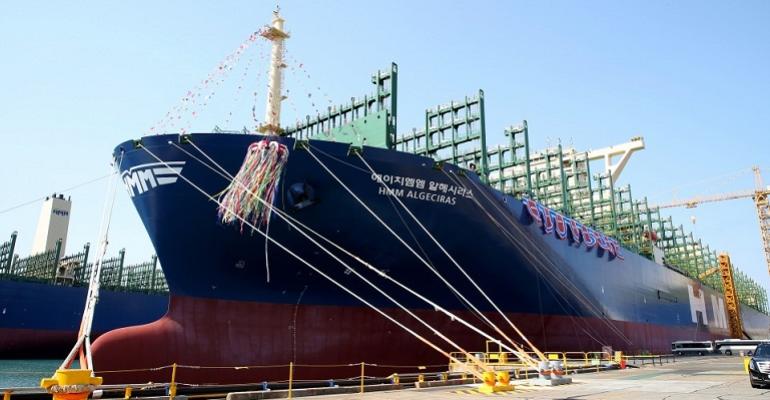Shareholders believe the synergies will offer better value to them, while industry bodies are concerned that logistics skills and capital will be lost if Hapag-Lloyd is successful in its bid. But analysts believe the major beneficiaries will be shippers.
Bids for the 40% combined stake in HMM, currently held by the state banking entities Korea Development Bank (KDB) and the Korea Ocean Business Corporation (KOBC) have been the subject of preliminary bids, with SM Line expected to be a key bidder in the process.
Analysts in Europe believe that if Hapag-Lloyd can convert the 40% stake into a controlling share, giving them the full control over HMM’s assets, it would result in an intensification in competition between the top lines.
Xenata chief analyst Peter Sand argues that going forward carriers will want to reduce their slot costs and for Hapag-Lloyd the sale of HMM represents “an opportunity to let go the more expensive time charter deals and it will see a significant upgrade in the size and efficiency of its fleet.”
Hapag would gain 24 mega-carriers of over 20,000 teu, half of which are owned with the others chartered. Another 12 ships of 13,000 teu are on order with already delivered to HMM, with 12 smaller vessels also on order. Nine of these are 9,000 teu methanol powered dual fuel vessels.
“Carriers will be looking at unit costs in order to reduce pricing, the larger the ships the better economies of scale and the lower those unit costs,” said Sand, in the end that will contribute to greater competition.
It would be necessary for Hapag-Lloyd to control the whole company for any synergies to be properly realised, added the semi-retired analyst and consultant Mark McVicar.
He said that the South Korean government needs to decide on whether it is better to maintain a flag carrier or if the company will be better served as part of a larger merged company.
Korea’s government has decided to go for an auction on its shares which suggests it’s decided on a merger as a better strategy.
“If having been through the Hanjin debacle and it [the government] decided HMM is best merged with something else, then it’s probably the best time to make the sale,” added McVicar.
He went on to say that this is “the most realistic time in the cycle to make the sale,” given that the carriers are emerging from the pandemic years with flush balance sheets, but “they will all be hurting now as they head into bigger losses”.
Having apparently settled on a strategy of merger the government has sparked a debate over whether the foreign carrier would benefit Korean logistics, or act as a drain on talent.
Minority shareholders in HMM have backed the sale to the German carrier, according to local reports.
The Korean Times reports: “According to the financial industry and the minority shareholders' association, some of the minority shareholders of the group have been gathering shareholder proxy statements through their online community set up in Naver Cafe platform, aiming to endorse Hapag-Lloyd as the most suitable candidate for the acquisition.”
The view among some shareholders is that KDB and KOBC have taken decisions “that undermine shareholder value in HMM,” the head of the minority shareholders' alliance Hong Yi-pyo reportedly said.
Minority shareholders expect that if HMM is acquired by Hapag-Lloyd share dividends will increase as synergies are realised.
However, the Korea JoonAng Daily reported that there are “Concerns that the sale of the nation's largest shipping firm to a foreign entity could undermine local maritime industry competitiveness and result in capital outflow, KDB is leaning toward domestic buyers.”
Further concerns were raised about the ability of domestic buyers’ ability to raise the required cash without support from private equity, which would “pose a threat to the stability and sustainability of HMM.”
Meanwhile, it had been expected that SM Line would bid, but local reports suggest that the carrier’s parent company Samira Midas could not meet the $3.8 billion starting price. Three South Korean bidders, Harim Holdings, Dongwon Group and LX Holdings and the German carrier Hapag-Lloyd have made the cut into the second round of bidding.
Assessment of the preliminary bids is expected to be completed by the end of this week with an announcement on which companies have made it through to the second round of the process.
A preferred bidder will then be selected with the sale expected to be completed by the end of this year.
Copyright © 2024. All rights reserved. Seatrade, a trading name of Informa Markets (UK) Limited.
Add Seatrade Maritime News to your Google News feed.  |

